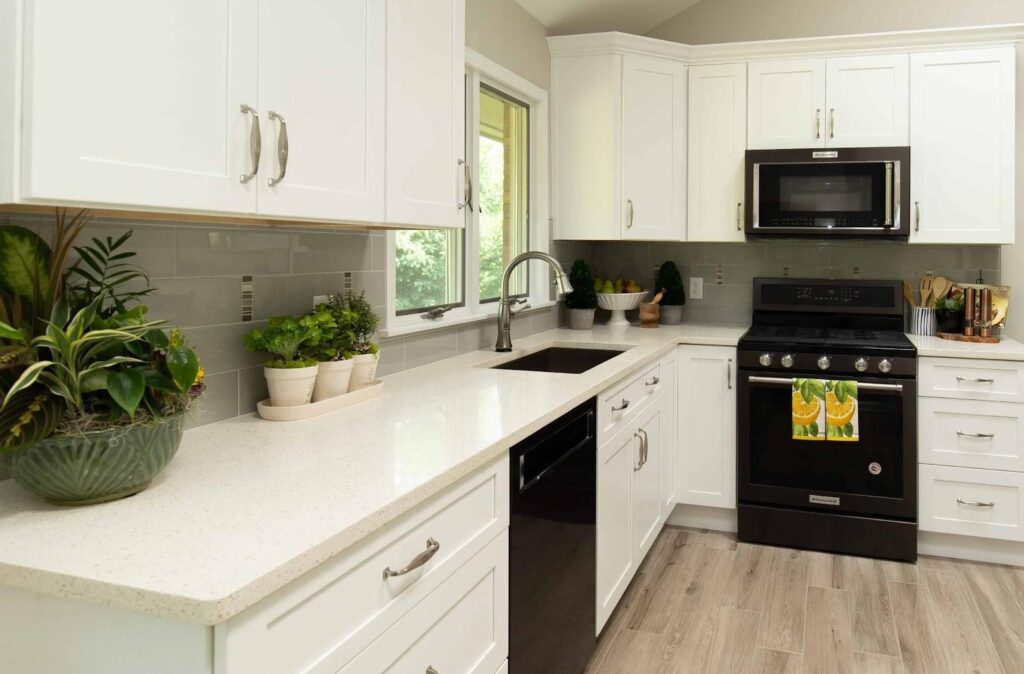Many homeowners assume quartz countertops are indestructible: immune to stains, scratches, or heat. Others dismiss them as too “engineered” compared to granite or marble. The truth is more nuanced than that, and we’ll break it down.
At Distinctive Surfaces, we’ve guided families through every stage of quartz countertop installation, and we’ve seen when quartz is the perfect fit—and when another countertop material works better. This guide explains what you should know before installing quartz in your kitchen.
What are the Performance & Everyday Realities of Quartz Countertops?
Installing quartz countertops is more than a design choice; it’s a lifestyle decision. Yes, quartz delivers strength and a polished look, but understanding how it behaves in everyday kitchen use is key. Here’s what homeowners should know before committing.
1. Durability & Strength
Quartz slabs are engineered from crushed quartz crystals combined with resin and pigments. This blend makes quartz one of the hardest countertop materials available, stronger in some ways than natural stones like granite or marble. For daily life, that means less worry about scratches from knives or scuffs from sliding cookware.
But “durable” doesn’t mean “indestructible.” While the flat surfaces of quartz countertops resist most everyday wear, the thinner areas, such as edges, corners, and cutouts, are more susceptible to chipping if struck by heavy objects. Think of dropping a cast-iron skillet on a corner: quartz can crack just like granite.
Compared to granite, quartz wins on stain resistance (more on that next). Compared to marble, it resists scratches better. But when it comes to heat resistance, granite takes the lead. Knowing where quartz shines and where it doesn’t prevents disappointment down the road.
2. Heat & Spill Resistance
If your kitchen is high-traffic, with kids, cooking experiments, or constant entertaining, quartz’s resistance to stains makes it a standout. Coffee spills, juice splashes, and even red wine typically wipe clean without leaving marks. Unlike natural stone, quartz is nonporous, so liquids don’t seep in too quickly.
Heat, however, is quartz’s weak spot. Because the stone is bound with resins, it reacts poorly to high temperatures. Setting a hot pot or pan directly on quartz can leave permanent discoloration or even cracks. That’s why our fabricators and installers always recommend you use trivets or hot pads. It’s a small step, but it preserves the surface long-term.
So, while quartz is ideal for everyday spills, it requires discipline with heat. This trade-off is one of the most important things a homeowner must accept before installation.
3. Maintenance Needs
Here’s where quartz wins major points. Unlike granite or marble, quartz requires no sealing. The engineered structure makes it low-maintenance and hassle-free. For most kitchens, all you need is mild soap and water for daily cleaning. Avoid abrasive cleaners or harsh chemicals, which can dull the resin finish.
This simplicity is why so many homeowners choose quartz during a kitchen remodel. Compared to the resealing schedules of granite or the delicate care of marble, quartz feels nearly “set it and forget it.” The only catch: consistency in care still matters.
Treat quartz right, and it looks new for decades. Neglect it, and even the most “low-maintenance” stone shows wear.
4. Style & Appearance
Because quartz is an engineered stone, it delivers consistency that natural stone can’t. Every quartz slab is designed with uniform colors and patterns, which means what you see in the showroom is what you’ll get in your home. For large kitchen spaces, this consistency minimizes visible seams, creating a smooth, modern finish.
For homeowners who love the look of natural stone, today’s marble-look quartz options replicate the veining of Carrara or Calacatta marble, without the upkeep. On the other hand, if you prefer sleek, modern styles, quartz offers solids and subtle tones that granite can’t replicate.
But here’s the important part: the appearance of quartz surfaces is only as good as the installation process. A poorly placed seam or mishandled slab can undo the beauty you fell in love with at the showroom. That’s why the next section—what to expect during installation—is just as critical as choosing the stone itself.
What to Expect During Quartz Countertop Installation
Choosing quartz is only half the journey—how it’s installed determines whether your kitchen remodel looks seamless or feels disappointing. Because quartz is heavy and precise, every step matters. Here’s what to expect.
- The Installation Process: It begins in the showroom, where you’ll select your quartz slab—the exact piece that sets the tone for your kitchen. From there, the fabricator creates a digital template of your space, measuring every angle with precision. Cutting and edging happen in-shop, before the slab is carefully delivered and set in place.
- This is where an experienced installer is essential. Handling quartz isn’t casual work: each move has to protect the slab, align the edges, and ensure the fit is perfect.
- Seams & Size: In large kitchens, multiple slabs are often required, which means visible seams. Skilled fabricators know how to align colors and patterns to minimize their impact—especially when working with marble-look quartz. Good seam placement is the difference between a polished finish and a distraction.
- Weight & Structure: Quartz countertops are heavy. Cabinets need to be checked for structural strength before installation, and reinforcement may be added where needed. Because quartz is denser than many natural stones, moving slabs is a team effort, usually two or more installers working in sync.
- Working With a Professional Installer: DIY may work for lightweight surfaces, but with quartz, improper handling can crack a slab or leave you with uneven seams. A trusted fabricator/installer ensures your investment looks the way it should: smooth, strong, and ready for decades of use.
- Cost Factors to Expect: The cost of quartz countertops varies. Factors include the grade of the quartz, brand, edge style, and the complexity of the fabrication. Don’t shop on price alone. The quality of the quartz and the skill of your installer ultimately decide how long it lasts.
Start Your Quartz Countertop Project with Distinctive Surfaces
Still considering quartz countertops for your kitchen remodel? At Distinctive Surfaces, our team helps you choose the right slab and handles expert installation with care. Visit our Round Lake showroom or book a no-pressure consultation to start your project.
What should I know before installing quartz countertops?
Before installing quartz countertops, understand that quartz is strong and low-maintenance but not heat-proof. It requires professional installation since quartz slabs are heavy and seams must be handled carefully. Choose a skilled fabricator and installer to ensure durability, beauty, and a smooth fit in your kitchen remodel.
Are quartz countertops better than granite or marble?
Quartz countertops are more stain-resistant and easier to maintain than granite or marble, since they require no sealing. Granite handles heat better, while marble offers unmatched natural veining. The best choice depends on what matters most to you—durability, low maintenance, or the natural stone look.
Do quartz countertops need to be sealed?
No. Unlike granite or marble countertops, quartz is nonporous and does not require sealing. The mix of resin and crushed quartz crystals makes quartz surfaces naturally resistant to spills and stains. This is why many homeowners choose quartz as a practical, low-maintenance countertop material for kitchens and bathrooms.
How do you clean quartz countertops properly?
Cleaning quartz countertops is simple. Use mild soap and water or a gentle cleaner with a soft cloth. Avoid abrasive pads or harsh chemicals, which can dull the resin surface. Regular wiping after spills preserves the finish and protects the beauty of your countertop for years.
What does the quartz countertop installation process involve?
The quartz countertop installation process begins with selecting a slab in the showroom, followed by precise templating of your kitchen. A fabricator cuts and edges the stone before skilled installers set it in place. Because quartz is heavy, professional handling ensures strong seams and long-lasting results.

